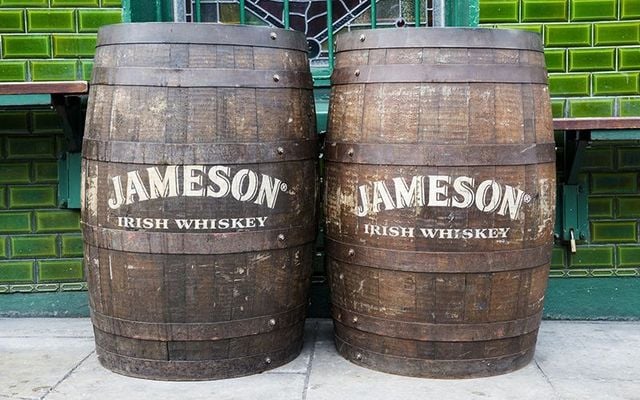Back in the 1930s, misbehaving Jameson Distillery employees would be denied their two daily shots of whiskey.
Today, there's often an entire human resources structure to address employees who break the rules, but at the Jameson Distillery back in the 1930s, they had what was known as The Punishment Book.
As archivist Carol Quinn explains in the Irish Distillers podcast "A Story of Irish Whiskey," the hand-written tome recorded employee wrongdoings such as being drunk at work or smoking on the job (very dangerous in a still house!) and the unique consequences used to teach rulebreakers a lesson.

Jameson Distillery, Bow Street, Dublin. Credit: Tourism Ireland
Instead of firing workers or docking their pay, the most common form of punishment was to deny them their twice-daily shots of whiskey, or, as it was referred to in the Punishment Book, having their "whiskey stopped."
At this time, it was customary for Jameson employees to receive a taste of the product they worked so hard to produce at the start and end of their shift, Having their whiskey stopped meant that they would no longer be granted this perk, for periods ranging from a day to a fortnight depending on the severity or frequency of their misdeeds.
"This would just kill you if every day you saw your friends and your coworkers lining up and getting their grog morning and evening, and you're standing there literally with your tongue hanging out watching this.," Quinn explains.
An important thing to note about this kind of punishment, she goes on to add, is that it didn't interfere with the workers' income. At this time, the men working in the distillery would have been the sole breadwinners for their families, and docking pay would have had a devastating impact on their security.
The podcast also includes an interview with brothers Tom and Dennis Savage, 82 and 87 years old, who worked in the Cork Distillery and fondly remember the breaks at 11 am and 4 pm for their daily grog.
The one action severe enough to warrant being fired instead of having your whiskey stopped was to steal product from the distillery. This was classified as stealing from the Inland Revenue Service and if product went missing from the distillery, it ran the risk of being shut down by the authorities.
But for the most part, denial of the daily grog was enough to teach a lesson. And what about employees who were teetotalers or had made the pioneer's pledge? They curried favor with their fellow workers by giving away their pours.
* Originally published in 2020. Updated in 2023.




Comments